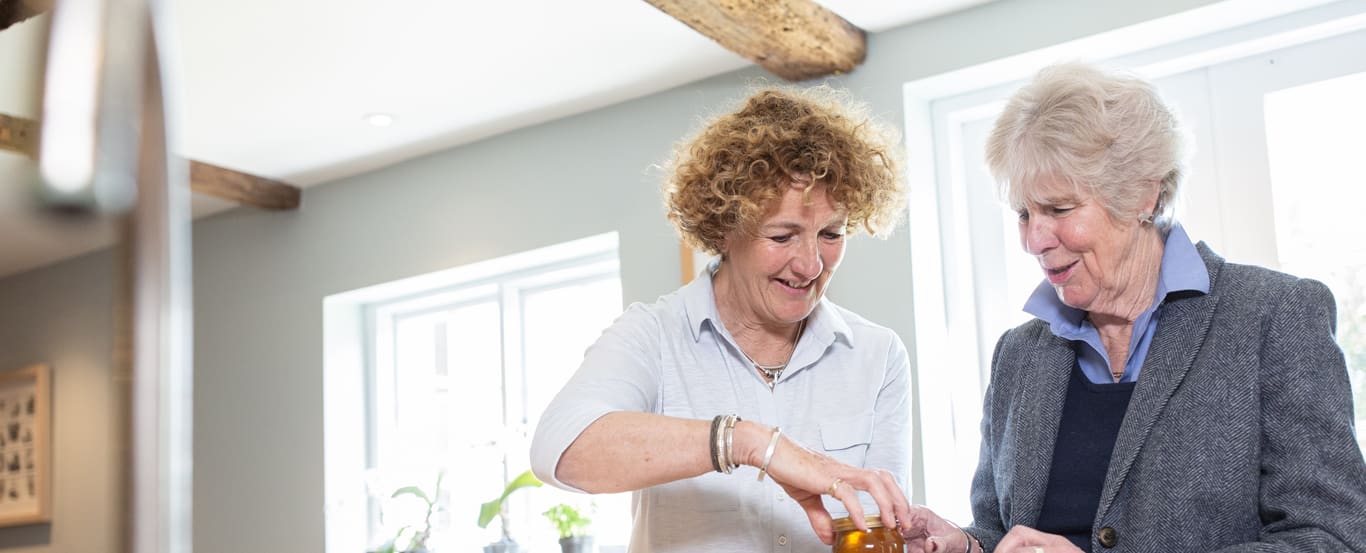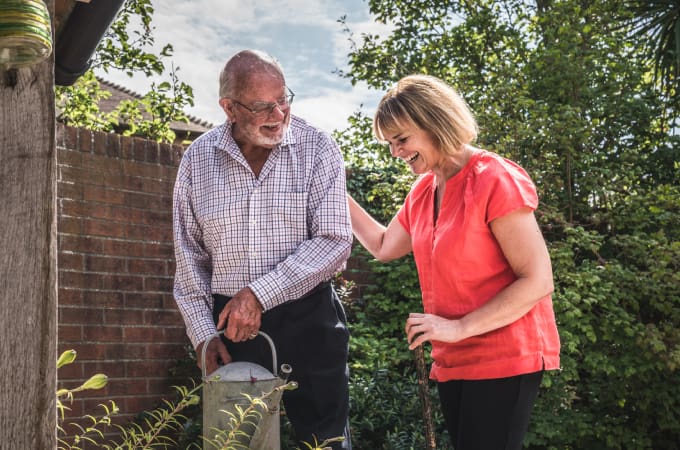Receiving a diagnosis of dementia can be a challenging and life-altering experience, not only for the person diagnosed but also for their loved ones and families. However, amidst the uncertainty and changes that come with this diagnosis, there are numerous ways to enhance the quality of life for those living with dementia.
From creating supportive environments to implementing personalised care plans, the journey of improving quality of life begins with understanding and compassion. Our expert dementia carers provide advice and guidance on how you can best support your loved ones.
After a diagnosis
After receiving a dementia diagnosis, it’s natural to feel overwhelmed and uncertain about what the future holds. However, this is also a time when proactive steps can be taken to ensure the best possible quality of life for both the individual with dementia and their carers.
You can learn more in our guide, “Dementia Diagnosis: what next?”
Getting assessed
After a loved one’s diagnosis, it’s important to get them assessed for care and support. Your local authority has a duty to conduct a care and support needs assessment to determine the level of assistance required. This assessment is provided free of charge and serves as a crucial first step in accessing the necessary support services.
To initiate the process, your loved one can apply for a needs assessment through the official government website, GOV.UK. Alternatively, if they prefer, a healthcare professional such as a GP or another health or social care provider can make a referral with their consent. This assessment is comprehensive and aims to identify their specific needs, preferences, and goals, laying the foundation for a personalised care plan tailored to their unique circumstances.
Getting services and support
Once our loved one has been assessed for care and support, it’s crucial to familiarise yourself with the available services in their area. Being informed and prepared will enable you to access the support they need effectively when the time arises.
Local authorities offer a variety of services, including home care services, provision of equipment, and adaptations for their home. These services are designed to promote independence and enhance the quality of life for individuals living with dementia.
Additionally, some services, such as community nursing, are arranged by the NHS. We can obtain further information about these services from their hospital consultant or GP.
Charitable organisations like Age UK, Alzheimer’s Society, and Dementia UK provide a wide range of support services tailored to the needs of individuals with dementia and their caregivers. These services may include helplines, support groups, day centres, shopping services, and home care.

Improving quality of life for people with dementia: tips & advice
Living with dementia poses unique challenges, but there are practical strategies that can enhance the quality of life for your loved ones. Here are some tips and advice to consider:
Help them feel safe and comfortable
Ensuring the safety and comfort of individuals with dementia is paramount. There are many small steps that you can take that can have a major impact on your loved one’s safety and security.
To prevent accidents, remove potential hazards from the environment, such as sharp objects or cluttered pathways. Use assistive devices like grab bars and handrails to promote mobility and stability while moving around the home. Establishing a familiar routine and maintaining a calm, reassuring demeanour can also contribute to feelings of security.
You can use our free home safety checklist to get started.
Practice better communication
Effective communication is at the heart of supporting individuals with dementia and promoting positive interactions. The structural changes that occur in the brain due to dementia can make it difficult for people to express their needs and wants. Learning how to communicate with your loved ones in a way that is meaningful to them can help them communicate their wishes and preferences and enjoy a better quality of life.
Here are some tips on talking to someone with dementia:
- Use simple language: Use clear, concise language and avoid using complex sentences or jargon. Speak slowly and clearly, allowing time for the individual to process information.
- Listen attentively: Listen actively to what the individual is saying, paying attention to their verbal and nonverbal cues. Show empathy and understanding, and validate their feelings and experiences.
- Maintain eye contact: Establish and maintain eye contact to convey attentiveness and connection. This helps individuals feel valued and respected during conversations.
- Be patient: Be patient and give the individual time to express themselves. Avoid interrupting or rushing them, as this can lead to frustration and communication breakdowns.
- Use visual aids: Use visual aids such as pictures, gestures, or simple drawings to enhance understanding and facilitate communication, especially for individuals with cognitive impairments.
- Provide choices: Offer choices whenever possible to empower the individual and promote independence. For example, instead of asking open-ended questions, offer simple options to guide decision-making.

Encourage meaningful activities
Engaging individuals with dementia in meaningful activities can provide a sense of purpose, fulfilment, and enjoyment. Beyond these immediate benefits, meaningful activities can also have long-lasting positive effects on their overall well-being.
By participating in activities that resonate with their interests and preferences, individuals with dementia can maintain a sense of identity and autonomy. Additionally, meaningful activities can stimulate cognitive function, promote emotional expression, and foster social connections, which are crucial aspects of maintaining quality of life.
Here are some ideas to consider:
- Laughter therapy: Laughter is often referred to as the best medicine. Incorporate activities that promote laughter and joy, such as watching funny movies, telling jokes, or participating in playful activities.
- Music and dance: The power of music on dementia is well studied. Create opportunities for singing, dancing, or listening to favourite songs together. Music therapy can be particularly beneficial for individuals with dementia, helping to reduce anxiety and improve mood.
- Pet therapy: Interacting with animals can bring immense joy and comfort to individuals with dementia. Consider incorporating pet visits or spending time with therapy animals to provide companionship and sensory stimulation.
- Social outings: Plan outings and social activities that offer opportunities for fun and enjoyment. This could include visits to local parks, museums, community events, or simply enjoying a meal at a favourite restaurant with loved ones.
- Celebrations and special occasions: Mark special occasions and milestones with celebrations and festivities. Whether it’s a birthday, holiday, or family gathering, create memorable experiences that bring joy and create lasting memories for individuals with dementia and their loved ones.
…but don’t forget fun activities
While meaningful activities are important, it’s also essential to incorporate fun and enjoyable activities into the daily routine. Fun activities can provide moments of laughter, joy, and relaxation, which are equally beneficial for individuals with dementia. These activities can help alleviate stress, reduce anxiety, and improve mood, contributing to overall well-being. By striking a balance between meaningful and fun activities, we can create a holistic approach to care that addresses both the emotional and cognitive needs of individuals with dementia.
Take a look at our guide on dementia-friendly activities for inspiration.
Spend time talking and sharing memories
Engaging in conversations and reminiscing about past memories can be deeply enriching for individuals with dementia. Creating a comfortable and relaxed environment is key to fostering meaningful interactions. Choose a quiet space free from distractions, ensure adequate lighting, and make comfortable seating arrangements.
Start conversations with familiar topics or memories that are likely to evoke positive emotions. Encourage storytelling by asking open-ended questions that invite individuals to share their thoughts and memories. Avoid correcting or interrupting them, allowing them to express themselves freely.
You can use props such as old photographs, souvenirs, or familiar objects to trigger memories and stimulate conversation. Practise active listening, giving the individual your full attention and showing genuine interest in their stories. Sharing your own memories can create a sense of connection and rapport, fostering deeper understanding and connection.
Consider capturing these memories through audio recordings, written notes, or scrapbooks, providing cherished keepsakes for both the individual and their loved ones. Spending time talking and sharing memories not only preserves cherished moments but also strengthens emotional connections, enhancing the overall quality of life for individuals with dementia.

Encourage good health
Promoting good health is essential for individuals with dementia to maintain overall well-being. Here are some ways to support their health:
Encourage regular physical activity tailored to their abilities, such as gentle walks or chair exercises, to improve mobility and reduce the risk of falls. Provide nutritious meals and snacks to support their physical health and cognitive function. Ensure they stay hydrated by offering plenty of fluids throughout the day. Our guide on exercise for elderly people can help get you started.
Prioritise mental stimulation through activities like puzzles, reading, or listening to music to maintain cognitive function and prevent decline. Support social engagement by facilitating visits with family and friends, participating in group activities, or joining community events to reduce feelings of isolation and loneliness.
Attend medical appointments regularly to monitor their health and address any concerns promptly. Work closely with healthcare professionals to manage medications effectively and address any underlying health conditions.
Encourage relaxation techniques such as deep breathing exercises or mindfulness activities to reduce stress and promote emotional well-being. Maintain a consistent sleep routine to support restful sleep and overall health.
Support for dementia carers
Caring for someone with dementia can take a toll on both emotional and physical well-being. At The Good Care Group, we understand the importance of carers looking after themselves too. That’s why we offer specialised respite care services, providing carers with much-needed breaks. Our professional carers deliver compassionate support tailored to individual needs, ensuring loved ones receive high-quality care in a safe environment while carers take time to rest and rejuvenate.
In addition to respite care, we encourage carers to prioritise self-care by seeking support from family and friends, joining support groups, and practising stress-reducing activities such as mindfulness or exercise. It’s essential for carers to maintain their own health and well-being to continue providing the best possible care for their loved ones. With respite care and a focus on self-care, carers can find the balance they need to navigate the challenges of caring for someone with dementia.

CQC-rated ‘Outstanding’ live-in dementia care
At The Good Care Group, we know receiving bespoke dementia care in the comfort, safety and familiarity of your own home has far reaching benefits in improving health and well-being for a person living with dementia. For over 10 years, we’ve helped countless families just like yours receive the dedicated dementia care they need in the place they love most – their own home.
Contact us for your free, no-obligation home care assessment. We will meet with you and your family at a convenient time to discuss your care needs and how we can help.
